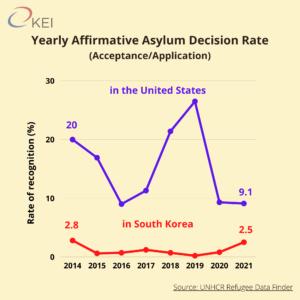The Peninsula
Korea’s ad hoc and instrumental refugee policy

A recent hearing by the Congressional Human Rights Commission expressed hopes for a breakthrough in South Korea’s refugee policies under the Yoon administration. Despite its growing international status and economic power, the country retains an extraordinarily low refugee acceptance rate of 1.5%.

South Korea’s refugee policies have been so far shaped by political expedience, not principles. Enacted in 2013, the Refugee Act placed emphasis on human rights because lawmakers drafted the bill in 2009 when there was heightened public support for North Korean defectors. The National Assembly then shifted its focus to prioritizing national security over the rights of refugees when the public responded to the arrival of Yemeni asylum seekers in 2018 with hostility. The recent designation of Afghans who supported ROK forces as “special contributors” and their resettlement in South Korea after the Taliban’s capture of Kabul once again underscored Seoul’s tendency to deal with refugee issues in an ad hoc manner.
President Yoon Suk Yeol’s stated commitment to human rights and the new Justice Minister’s agenda for establishing an independent immigration agency raised hopes for more principled and efficient refugee screening procedures. However, discussions on refugee policy appear to be once again shaped by larger political and social agendas as the government has placed emphasis on the country’s need for workers to sustain economic growth in an aging society. The discourse once again places emphasis on state expedience rather than principles of human rights .
As cross-border restrictions ease with greater global inoculation against COVID-19, Seoul’s posture may create frictions with its international partners who seek policy harmonization and international responsibility-sharing.
This briefing comes from Korea View, a weekly newsletter published by the Korea Economic Institute. Korea View aims to cover developments that reveal trends on the Korean Peninsula but receive little attention in the United States. If you would like to sign up, please find the online form here.
Korea View was edited by Yong Kwon with the help of Jae Chang, Kaitlyn King, Yu Na Choi, and Mai Anna Pressley. Picture from the flickr account of Michael Grabois
